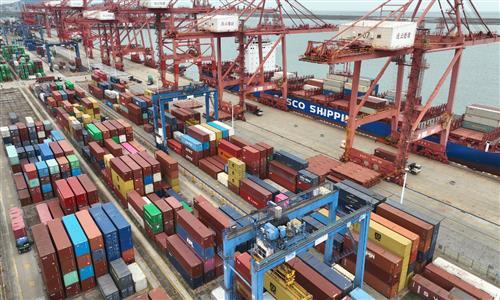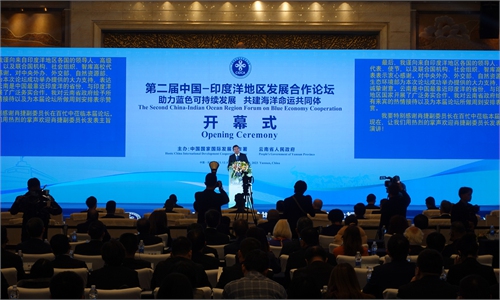

The skyline of Lujiazui in Shanghai Photo: CFP
The annual Central Economic Work Conference, which set the tone for economic policymaking in 2024, pointed out that "the proactive fiscal policy should be moderately strengthened and its quality be improved."
In terms of policy direction, "moderate strengthening and quality improvement" is basically consistent with last year's "fiscal strengthening and efficiency improvement," reflecting the continuity of policies. The Ministry of Finance used the term "strengthening and efficiency improvement" during a press conference in early March, which means moderately increasing the expansion of fiscal policies and enhancing policy effectiveness.
"Moderate strengthening" means that fiscal policy will increase its expansionary measures in a timely and moderate manner, in order to consolidate and improve the foundation for China's economic recovery.
Emphasizing moderation is mainly based on the following considerations: On the one hand, as the economy continues to recover, there is a basis for fiscal revenue growth, reducing the necessity for excessive fiscal expansion and leaving more policy space for macroeconomic regulation.
On the other hand, the central government has announced 1 trillion yuan ($139 billion) of bonds for transfer payments to local governments. Considering the time required for bond issuance, fund allocation and project application, the actual expenditures will take place next year.
Adequate fiscal stimulus
The goal of "fiscal strengthening and quality improvement" is to optimize the structure and strengthen management, further improve policy implementation mechanisms, and effectively enhance policy effectiveness and financial efficiency. This is a long-term objective of fiscal policy, aiming to alleviate local fiscal pressures and ensure sustainable local growth.
As for specific measures, it is expected that the fiscal deficit ratio next year may be slightly lower than this year's 3.8 percent, but it will continue to exceed 3.0 percent, leaving room to deal with internal and external uncertainties.
Considering stable growth and risk prevention, the scale of new special-purpose government bonds may increase slightly from this year's 3.8 trillion yuan to about 4 trillion yuan. Preferential tax and fee policies and the structure of fiscal expenditures will be optimized to enhance policy effectiveness, taking into account both the supply and demand sides, thereby accelerating the formation of a virtuous cycle of consumption and investment.
The conference proposed that a prudent monetary policy should be "flexible, moderate, precise and effective." In terms of monetary supply, the conference emphasized that "the scale of social financing and the supply of overall liquidity should match the country's economic growth and the expected inflation target."
Compared with the languages used in last year's Central Economic Work Conference, the original target of "nominal economic growth rate" has been split into "economic growth" and "inflation target," emphasizing the important role of monetary policy in stabilizing overall price levels.
Inflation may become an important factor in judging whether monetary policy is "effective" in the next stage. This year, prices have been running at a very low level, and it is expected that monetary policy will be moderately expanded in 2024 to promote a moderate increase in prices.
The conference proposed that "a prudent monetary policy should be flexible and moderate, precise and effective," which is consistent with the statement made at the Political Bureau meeting held on December 8. This is the first time that the term "precise and effective" has appeared in the words of the Central Economic Work Conference. The term "effective" reflects the focus on policy implementation and the effectiveness of policy measures, and it will play an important role in assessing the effectiveness of monetary policy.
Proper liquidity supply
In 2024, a prudent monetary policy will be adjusted flexibly based on internal and external conditions, liquidity conditions and other factors. A range of policy tools, both in terms of quantity and structure, will be utilized to maintain reasonably ample liquidity supply and meet the financing needs of the real economy.
With the external interest rate hike cycle coming to an end, as well as the domestic focus shifting to stable growth and risk prevention, the overall monetary policy will remain prudent and accommodative. There is still room for reserve requirement ratio cuts and interest rate reductions to help maintain stability in the banking system's liquidity and promote a moderate decline in overall financing costs, aiming to create a favorable financial environment for all businesses.
China's economy remains on the trajectory of recovery, but there have been fluctuations in the process, as indicated by the November purchasing managers' index and the consumer price index. However, the economy is expected to achieve a growth of about 5.3 percent in the fourth quarter, and there isn't too much pressure to meet the annual growth target.
The challenges facing the economy in 2024 have been stated in the Central Economic Work Conference, including insufficient effective demand, excess capacity in some industries, weak social expectations and the hidden risks. There are still obstacles in domestic circulation, while the external environment has become more complex, severe and uncertain.
Compared with the previous two years, pressure has eased to some extent, but these challenges and difficulties should not be ignored.
Social expectations
The economic goals for 2024 are focused on three aspects: enhancing economic vitality, preventing and resolving risks, and improving social expectations.
Enhancing economic vitality involves increasing macroeconomic regulation, focusing on expanding domestic demand, and deepening reforms in key areas to unleash the innovative drive and vitality of enterprises and mobilize the enthusiasm of all parties.
Preventing and resolving risks entails coordinating the resolution of risks in real estate, local government debt, and small and medium-sized financial institutions, cracking down on illegal financial activities, and firmly guarding against systemic risks.
Improving social expectations involves "strengthening the consistency of macroeconomic policy orientation" to form overall policy synergy.
In 2024, the external environment will remain complex and challenging, and stabilizing domestic demand is deemed the cornerstone and foundation of economic development. The Central Economic Work Conference proposed to "stimulate consumption with potential, expand investment with effectiveness, and form a virtuous cycle of mutual promotion between consumption and investment."
Compared with previous statements, the emphasis is on "potential," "effectiveness" and "virtuous cycle." This means that policies will no longer stimulate consumption and investment in isolation, but instead take a long-term perspective, aiming to improve the efficiency of the market economy's operation and striving to achieve a virtuous cycle of reinforcement between investment and consumption, enhancing the sustainability of domestic demand growth.
The author is chief economist at China Minsheng Banking Corp. bizopinion@globaltimes.com.cn



